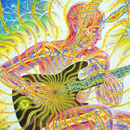How LSD Makes Music Profoundly Awesome
AlterNet
Fri March 9, 2018
Listening to Jimi Hendrix on acid back in the day was absolutely mind-melting. The sounds transcended normal tonality-not to mention space-time-and the music itself took on deep, deep meaning. It seemed like he was plugged into the primal energies of the universe, and profound truths flickered like jagged lightning.
It wasn't just the music of the master, either-LSD had the uncanny ability to imbue even the most saccharine dreck with cosmic connotations. Any old head who suddenly "got" Terry Jacks' "Seasons in the Sun" in an acid-induced tearful epiphany knows whereof I speak.
Now, some new research helps explain why that happens. A recent study in Cerebral Cortex found that LSD changed the perception of music by altering the neural response in certain key brain regions, including those that govern emotion, memory, sound processing, and self-directed thought.
In the study, a team of researchers led by Katrin Preller and Franz X. Vollenweider of the University of Zurich interviewed 25 subjects about songs that were personally meaningful to them, then had the subjects listen to personally meaningful songs and songs that had no particular significance while given LSD or a placebo. In one session, subjects were given LSD and ketanserin, a drug that blocks LSD's ability to act on serotonin 2A receptors.
Under the influence of LSD, the researchers found, even non-meaningful songs picked up a sense of meaningfulness.
"Music can evoke a wide range of emotions, memories, and other feelings and states of mind. We can often identify with music, and music can change the way that we feel about and think about ourselves," study co-author Frederick Barrett of Johns Hopkins University School of Medicine told PsyPost. "In the same way, music also engages a broad range of brain regions involved in memory, emotion, attention, and self-directed thought. LSD increases the ?degree to which these brain areas process music, and it seems to use a brain mechanism that is shared across all psychedelic drugs (serotonin 2A receptor signaling).
"These brain changes during music listening and LSD may (hypothetically) be the mechanism by which psychedelic drugs can be therapeutic," Barrett continued. "Also, these brain changes may uncover the underlying way that our brain makes meaning, with or without music and psychedelic drugs. Psychedelics are powerful drugs that hold promise to help us to heal, understand our brains and minds, and potentially uncover the elusive basis of consciousness itself."
Barrett also noted that a growing number of studies have suggested psychedelics could be used to treat psychiatric disorders, but he urged caution.
"While psychedelic drugs can be safely administered in a controlled setting to properly screened individuals, they are still very powerful drugs that may not be safe for everyone and may not be safe in many circumstances. The degree to which these elements (music, LSD, and serotonin 2A receptor signaling) are necessary for any successful therapy has yet to be determined," he explained. "The degree to which any of these elements interacts with challenging experiences (or 'bad trips') has yet to be determined. Also, the degree to which we can optimize music listening during psychedelic therapy sessions has yet to be determined, though these are all active areas of research."
In the meantime, Hendrix still sounds great on acid, even in uncontrolled settings. But would it make Justin Bieber tolerable? Further research is required.
Phillip Smith is editor of the AlterNet Drug Reporter and author of the Drug War Chronicle.





 Share your thoughts in the Forum
Share your thoughts in the Forum
